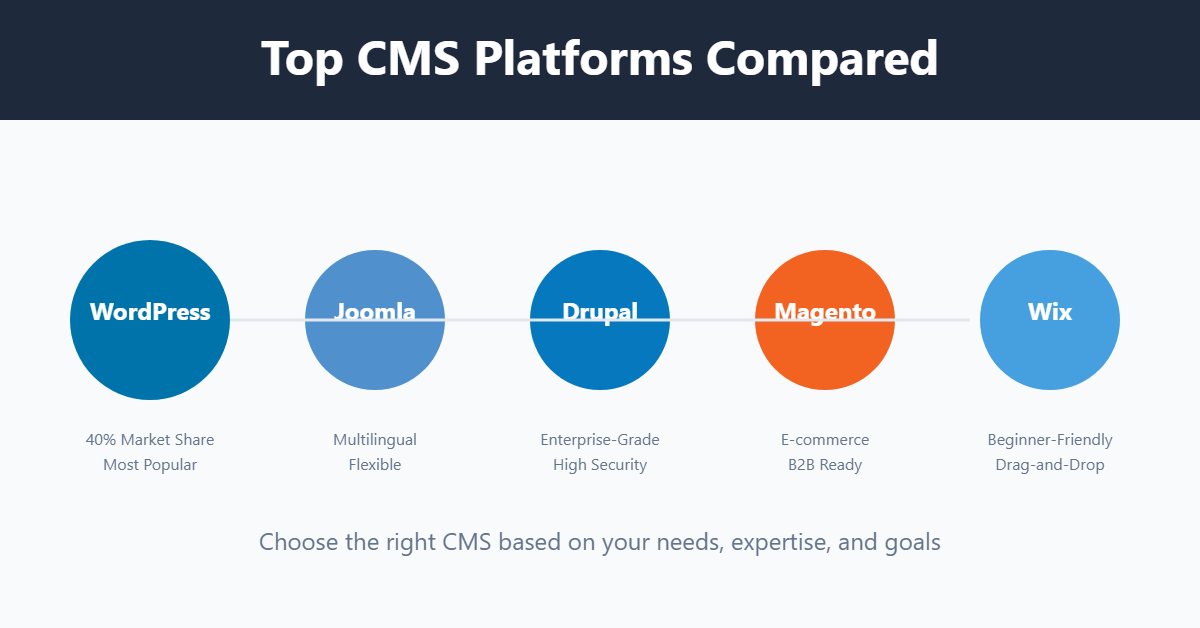Which CMS is Best? Top 5 Content Management Systems Compared

Deciding which CMS is best for your website can significantly impact its success. With numerous options available nowadays, choosing the right Content Management System (CMS) requires careful consideration of your specific needs, technical expertise, and long-term goals. Let’s explore the top CMS platforms that can help you build and manage your website effectively.
Key Takeaways
- WordPress dominates with over 40% market share and offers the most extensive plugin ecosystem
- Joomla excels in multilingual support and advanced user management
- Drupal provides enterprise-level security and scalability
- Magento specializes in e-commerce functionality
- Wix offers the easiest learning curve for beginners
Table of Contents
WordPress: The Versatile Market Leader
WordPress continues to reign as the most popular CMS platform, powering over 40% of websites worldwide. Its intuitive interface and extensive customization options make it suitable for projects of any size.
Why Choose WordPress?
WordPress stands out for its:
- Active community support and regular updates
- User-friendly dashboard requiring no coding knowledge
- Vast library of over 58,000 plugins for enhanced functionality
- Extensive theme marketplace for quick design implementation
- Strong SEO capabilities out of the box
Check out: Best WordPress Hosting Providers for Starters
Joomla: Power and Flexibility Combined
For those seeking a balance between power and usability, Joomla offers robust features while maintaining reasonable ease of use. It’s particularly well-suited for dynamic websites that require complex data organization.
Why Choose Joomla?
Joomla stands out with its:
- Built-in multilingual support for global reach
- Advanced user management system for team collaboration
- Flexible content organization with nested categories
- Integrated access control levels
- Strong security features and regular updates
Drupal: Enterprise-Level Performance
When scalability and security are top priorities, Drupal delivers enterprise-grade solutions. While it requires more technical expertise, it rewards users with unparalleled flexibility and robust performance.
Why Choose Drupal?
Drupal excels in:
- Enterprise-level security protocols
- Advanced content workflow management
- High-performance handling of large traffic volumes
- Custom content type creation
- Sophisticated user permission systems
Magento: E-commerce Excellence
For online stores and e-commerce businesses, Magento provides a comprehensive solution. Now part of Adobe Commerce, it offers sophisticated features specifically designed for digital retail.
Why Choose Magento?
Magento distinguishes itself with:
- Advanced product management capabilities
- Multiple store management from one dashboard
- Sophisticated inventory tracking systems
- Built-in B2B functionality
- Powerful marketing and promotion tools
- Advanced analytics and reporting
Wix: Simplicity Meets Style
Perfect for small businesses and creative professionals, Wix combines ease of use with professional features. Its intuitive interface makes website creation accessible to everyone, regardless of technical background.
Why Choose Wix?
Wix impresses with:
- Intuitive drag-and-drop website builder
- AI-powered design assistance
- Comprehensive template library
- Built-in SEO tools
- Integrated hosting and security
- Mobile-responsive designs

Making Your Decision
Choosing which CMS is best depends on several factors:
- Technical Expertise
- WordPress: Beginner to intermediate
- Joomla: Intermediate
- Drupal: Advanced
- Magento: Advanced
- Wix: Beginner
- Budget Considerations
- Initial costs
- Ongoing maintenance
- Plugin/extension expenses
- Hosting requirements
- Website Purpose
- Blogging: WordPress
- E-commerce: Magento or WordPress with WooCommerce
- Community sites: Drupal or Joomla
- Portfolio sites: Wix
- Enterprise websites: Drupal

Conclusion: Finding Your Perfect Match
The best CMS for your website ultimately depends on your specific needs, technical capabilities, and growth plans. WordPress offers the most versatile solution for most users, while Drupal and Magento cater to specialized needs. Joomla provides a middle ground, and Wix offers the quickest path to launching a professional website.
Consider starting with a platform that matches your current needs but can scale with your growth. Remember that migrating between CMS platforms can be challenging, so choosing the right one from the start is crucial for long-term success.
Final Tips for Success:
- Test different platforms using demo versions
- Consider your long-term growth plans
- Evaluate the total cost of ownership
- Assess the available support resources
- Check the platform’s update frequency and security record
By carefully considering these factors and understanding your specific requirements, you’ll be better equipped to choose the CMS that best serves your website goals both now and in the future.